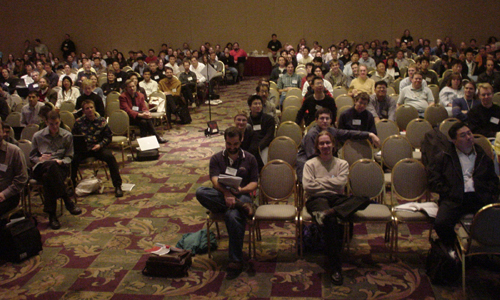 |
|
October 19, 2003ubicomp 2003The second half of my northwest adventures was to attend the Ubiquitous Computing (UbiComp) conference in Seattle. It was my first time in Seattle, and it only rained one out of the three days I was there, so I made out pretty well. Took a long bus ride from SeaTac into downtown, giving me a chance to soak in some of the people and surroundings (including a large number of Seahawks fans making their way to the stadium). I stayed in downtown a few blocks from the Space Needle. For some reason the city saw fit to install a monorail from the Westlake mall in downtown to the Space Needle area... totalling a whopping half-mile of monorail action. Reminded me of a certain Simpson's episode. The conference itself was interesting, though overall less impressive than I was expecting. Here's a run-down of some of my favorite papers: I also think my own talk went pretty well. I was presenting a streaming query system for supporting context-aware computing, the result of a systems class project I did with my friends Alan and Chris. This was the largest crowd I've ever spoken in front of (not counting theatre or concert performances), so I couldn't resist taking a picture of the audience at the beginning of the talk. The picture captures a little over 1/3 of the room...
Overall, I enjoyed the conference, and was glad to see a mix of disciplines and approaches represented. The demonstrations as a whole leaned towards interactive art, which I appreciate, but felt that in addition there could have been some more compelling demos that tackle real-world problems. In terms of papers, I found myself getting most interested in the socially-oriented research, perhaps because I'm less familiar with it and find it more inspiring and thought-provoking than software systems design papers. That being said, in the future I'd really like to see more novel hardware contributions... the LED paper was great and I'd love to see more work on novel sensors, actuators, and input/output mechanisms. As the years march on, I'm interested to see how these technologies we're building, discussing, and critiquing eventually influence the world around us. I'm still wondering what parts of ubicomp (e.g., context-aware computing) will catch on and what technologies or approaches won't live up to the hype. What technologies are compelling and enriching enough that end-users will clamor for them? How will they affect our privacy, our work habits, and our social lives? Already cell phones are acquiring location-tracking services, which seems like a primary vector for ubicomp work to start streaming into the market. Developments in ubicomp are already sparking plenty of skepticism and debate. For now I'm optimistic, yet vigilant. As I see it, UbiComp researchers and developers have a double burden placed upon them - not only to invent the technologies of the future that attempt to integrate computational tools into the backdrop of human activity, but to do so in a way that carefully avoids impinging upon both our liberties and humanity. Fortunately, I got the strong impression that most of my fellow conference-goers whole-heartedly share this outlook. update: Anne Galloway had the nicest things to say about our ubicomp paper. Thanks! Posted by jheer at October 19, 2003 08:29 PMComments
Trackback Pings
Trackback URL
|
| jheer@acm.Ýrg |
